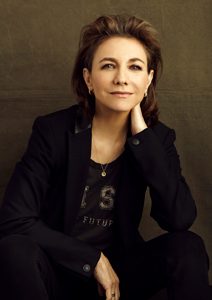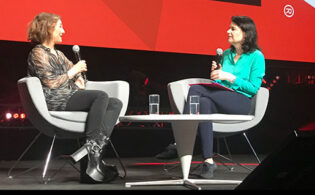 Ilene Chaiken started her career as a film screenwriter and TV executive before writing the Showtime TV movie Dirty Pictures, which won a Golden Globe in 2001. She had never written a series, but had an idea for a show about lesbians in Hollywood and pitched it to Showtime. The L Word, a cultural trailblazer, depicted the lives and loves of gay women. Chaiken has continued to champion underrepresented and marginalized communities in her work. She was showrunner on the first few seasons of Empire, she wrote the first script for The Handmaid’s Tale and was instrumental to the return of The L Word. While crafting entertaining shows, Chaiken always weaves into storylines causes that she believes in passionately, such as gender equality and diversity.
Ilene Chaiken started her career as a film screenwriter and TV executive before writing the Showtime TV movie Dirty Pictures, which won a Golden Globe in 2001. She had never written a series, but had an idea for a show about lesbians in Hollywood and pitched it to Showtime. The L Word, a cultural trailblazer, depicted the lives and loves of gay women. Chaiken has continued to champion underrepresented and marginalized communities in her work. She was showrunner on the first few seasons of Empire, she wrote the first script for The Handmaid’s Tale and was instrumental to the return of The L Word. While crafting entertaining shows, Chaiken always weaves into storylines causes that she believes in passionately, such as gender equality and diversity.
WS: What did you learn about staffing the writers’ room for The L Word?
CHAIKEN: I learned so much. I knew nothing when we began. I didn’t know what it was going to be like to work with other writers. I was horrified by the prospect. There’s much to say about this, but I was advised [that I didn’t] need to hire lesbians to write this show, I just needed experienced writers—some straight guys, some gay guys and a little of everything. I did [that] because I wanted to be a good team player. What I found out from the first season of the show was that the only ones who could really write this show were lesbians. It became less true as time went on, but it became a lesson that I would carry with me forever, which is that when you’re telling stories about a marginalized group of people, whose lives have never been portrayed, the people who should tell their stories are people who have lived that experience.
WS: In The L Word, you were telling stories based on your experiences. What was it like having other writers tell your stories?
CHAIKEN: At first I thought, I’m not going to be able to do this; I don’t want anybody else writing my show. But I very quickly learned what a great experience a writers’ room is and how that collective creative effort yields something greater than the sum of its parts. I loved working with other writers. I wasn’t telling just one story, particularly on The L Word. I was representing a community of people. And those other writers who were my collaborators had so much to offer, and they knew things that I didn’t know.
WS: I understand you initially turned down working on Empire. What finally convinced you to be its showrunner?
CHAIKEN: I turned down the opportunity or the proposition of working on Empire. Once I saw the pilot, there was no question in my mind. But I turned it down because I had worked on a couple of other people’s shows [as a showrunner], which was gratifying and flattering, but I wanted to go back to doing my own work. I wanted to create my own show. I had just written The Handmaid’s Tale, and I was still waiting to hear if Showtime was going to agree to buy it. I had said to my agents, I don’t want to take a job, I want to keep working on my own stuff. And they said, Great, but would you just look at this? There were a couple of other shows that I had to look at too. I dismissed them, and they weren’t of interest to me, but the Empire script was written by Danny Strong and Lee Daniels—very interesting filmmakers—and I said, OK, I’ll read it, but I’m not going to do it. I read it, and I said, This is good, but I’m still not going to do it. And then they said, OK, but they just shot the pilot, and they want you to see it. I said, Sure I’ll see it, but I’m not going to do it. [Laughs] I went over to Fox, and because everything is top secret at that point and nobody’s allowed to see anything, they lock you in a little dark room all by yourself, which is the worst way to look at anything. Somebody comes in and presses the button and then goes out of the room and you’re in there watching it by yourself. I watched the pilot of Empire and as the lights came up, I was on the phone to my agent saying, I’ve got to do this.
WS: In The L Word, you were telling stories based on firsthand experiences. In Empire, you were initially telling Lee Daniels’ stories. How did you adapt to that?
CHAIKEN: Not only was I telling Lee Daniels’ stories but I was telling the stories of a community of people who were not me and whose experience I didn’t know. Empire was telling the story of an African-American family and it was clearly not my story. It was my responsibility to understand the stories that Lee and Danny Strong wanted to tell and to assemble a staff of writers whose stories they were and help them to tell those stories. Which is not to say I didn’t play a role in deciding what those stories were and writing the stories, but it was a role that started with my listening and deferring to people whose stories these were.
WS: Your shows are entertaining but also address serious social issues. How do you walk that line—entertaining and informing or raising awareness?
CHAIKEN: I don’t think they’re antithetical to one another. The latter feeds the former. When your shows are about something that you care passionately about, that’s what provides the energy, the drive for telling those stories. I choose my projects, firstly, based on their being about something I care deeply about. So, it’s a given that those themes are going to be interwoven in my stories. I am unabashed about telling stories that reflect those themes. I don’t think that it precludes their being entertaining. My sensibility happens to be to bend toward the loud and the flamboyant from time to time.
WS: You developed and wrote a script for The Handmaid’s Tale for Showtime. How did it then find its way to Hulu?
CHAIKEN: I was waiting for Showtime to decide whether or not they were going to go forward with it. There were all kinds of promising indications. They loved it; they said, We’re probably going to make it. But they work on their own schedule. I couldn’t just sit around doing nothing, so Empire came along and I took it. I was in the middle of the first season of Empire when Showtime decided that they weren’t going to go forward with The Handmaid’s Tale for whatever reason. I signed an exclusive overall deal with Fox while I was doing Empire and a couple of months after that, the studio, MGM, for whom I had done The Handmaid’s Tale, took it out to the marketplace. The president of MGM called me and said, Hey, great news, we just brought your script to Hulu and they ordered it straight to series, ten episodes. I said, Wow, that is great news, but I can’t do it. [Laughs] It’s that double-line, it’s a blessing and a curse. But I was thrilled nonetheless and I said, Find a new showrunner. It’ll always be mine; it’s close to my heart. I had tried for ten years to make that show.
WS: For a lot of women, The L Word was the first time they saw women like themselves portrayed on television. What reaction did you get at the time?
CHAIKEN: The first reaction was [one] of people who have never seen themselves represented and finally are seeing characters who look and feel and behave like them on television. It’s just joy. It’s affirming, and we see that in various contexts over the course of the evolution of entertainment culture. Up until that moment, I watched shows about straight people and pretended that they were gay or pretended that I was straight or tried to transpose experience. I know what that’s like and I understand what it was like for all gay people who were finally seeing other gay people on television. There was also the other reaction which was, well that’s not me; I don’t see myself. I’m a different lesbian or where’s my character. There’s a lot of that, and it’s really interesting. And still, I enjoy it; I welcome it. It’s fascinating and challenging. It also goes to the point that we’re not a monolithic community.
WS: The L Word is coming back. Tell us about that.
CHAIKEN: After Showtime made the terrible mistake of passing on The Handmaid’s Tale [laughs], I remained very close with some of my colleagues from The L Word, particularly three of the actors: Jennifer Beals, Kate Moennig and Leisha Hailey, who are my dear friends and we get together often. They started lobbying me about five years ago, saying we really should bring the show back, but I was kind of busy at the time. I didn’t think it was the right time and I didn’t want to say no to them—I never could—and I said, Sure, yeah, let’s do that, I’ll talk to Showtime about it. I kept putting it off and putting it off, and they never let up. They were relentless, to their credit. Then there came this moment when I thought it was time and I called my friend at Showtime, Gary Levine. He had been the executive on the original L Word. He’s now [co-president of entertainment at Showtime Networks]. I called him up one day, and he said, You’re calling me to tell me we should’ve bought The Handmaid’s Tale! [Laughs] I said, You should have, obviously, but no, I’m calling to ask you what you think about the idea of rebooting The L Word. And he said, But you can’t do that, you’re in an exclusive overall deal with Fox. I said, Yeah, I know, but I don’t think I should be the one to do it. I think some young lesbian who also happens to be a gifted television writer should do it—somebody who has some new stories to tell, who knows how the world has changed in ten years, who is going to bring The L Word back for a new generation of viewers. I think we should continue telling the stories of some of the original characters, but they’re older too, so create some young characters, put them all together, and let’s see if that’s interesting. About three days later, I was in Chicago producing an episode of Empire, and he called me and said, I think we’re going to do this. It never happens in this business that somebody makes a decision like that [quickly]. We found that hypothetical person that we had talked about, a new young writer, Marja-Lewis Ryan. She’s incredibly gifted. She wrote a fabulous script, and Showtime is going forward with the show and again they ordered it straight to series.
WS: With Empire and with The L Word, you told stories about groups of people who are marginalized and underrepresented on television. Why is it important to offer these shows to audiences?
CHAIKEN: They’re important to put out there to audiences because they really do have an impact in the world. Telling stories changes culture, changes lives, changes the way one individual feels about her or himself, changes the way that the rest of the world understands individual experiences. I also think that the audience is changing in really significant ways. It’s much more sophisticated and much hungrier for new stories. In some ways, the audiences have changed faster and become more sophisticated than the programmers. We don’t need to tell a story that’s been told before in the same way that it’s been told before. We don’t have to repeat the same formulas. For years, television did that, and did it very successfully; this worked, now we’ll do another version of this. You were either doing comedy or a [medical] show, a cop show or a crime show. Every show had to fall into one of those categories. Now, if you fall into an old category, you have nothing special to offer, nobody’s coming. I sincerely believe that what television does best and what’s needed and wanted from us is to see something we haven’t seen before, but that makes us feel connected to one another.
WS: What advice do you have for an aspiring young writer who wants to get into the business today?
CHAIKEN: I have two pieces of advice. There’s probably much more to say, but the first is to write, to study craft, and never stop writing and never stop getting better. Craft is key. It’s everything to learn from those who’ve done it and from studying. Malcolm Gladwell’s 10,000 hours theory is something that I really believe in because I’ve experienced it personally. Twenty years ago, I thought I was great! [Laughs] And I now know how much I didn’t know and it’s tangible, it’s palpable how much better I find myself becoming as a writer from doing it and doing it and doing it. The other thing that I think is even more important and maybe less known is to write with a passionate agenda. Write about the things you care about and let the things that you care about seep into your writing. I call it writing with an agenda. I know that people are told not to have an agenda, not to be political, not to advocate for anything in your writing, be neutral. I don’t believe that. I think that’s nonsense.



